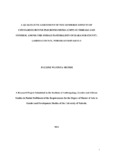| dc.description.abstract | Contagious Bovine Pleuropneumonia (CBPP) is considered a serious threat to women and
men cattle keepers. The disease has serious implications on the livelihoods of women and
men, household food security which is usually a woman‟s domain, control costs incurred by
women and men and the social welfare of women and men. Owing to the gender relations in
the prevailing culture, women and men are affected differently by CBPP outbreaks. Vaccine
technology adoption can be motivated in both women and men by occurrence of frequent
outbreaks. Eradication of CBPP can improve the well-being of women and men, though the
positive effects are often skewed in favour of men owing to the existing gender norms.
The study reported here responds to three objectives: to examine the gendered effects of
CBPP outbreaks, to determine the gendered responses in relation to CBPP control and to
establish the anticipated gendered effects of eradicating CBPP. The study adopted a crosssectional
exploratory research design, and data was collected in six sub-locations from Ijara
sub-county. Data was obtained through key informants interviews and they provided detailed
information on the effects of CBPP outbreaks and its control strategies. Focus group
discussions were held with a total number of 127 women and men discussants to obtain
information on the effects of CBPP outbreaks on women and men, the strategies employed by
women and men to control CBPP outbreaks and the anticipated positive and negative effects
of eradicating CBPP according to women and men.
The findings show that women and men are both affected by CBPP outbreaks however the
effects are gendered owing to gender norms and relations. Vaccination, treatment, quarantine
and prayers are strategies employed by women and men to control CBPP. Vaccination
hypothetical eradication scenario of CBP, the relationship and interactions of women and
men may be affected positively or negatively. The study concludes that the effects of CBPP
outbreaks are gendered, women and men employ similar strategies in controlling CBPP but
face different challenges in adopting those strategies and eradication of CBPP is linked to
affluence and happiness and on the other hand it is also associated with a series of failed
marriages.
This study recommends that more studies on livestock diseases and vaccines ought to be
engendered because there is need to identify the gendered effects of livestock disease
outbreaks to enhance feasible ways of closing the gender impact gap. Women and men face
different barriers in adopting livestock vaccines and hence there is need to employ effective
strategies to close these barriers and ensure equitable adoption of livestock vaccines by
women and men. More analysis on the gender differentials should be conducted on the
preferences of women and men to enhance equitable benefits for women and men from
vaccination and vaccine adoption. Eradication of a disease may either have positive or
negative effects on the relationships and interactions of women and men hence, there is need
to ensure gender-responsive eradication strategies that will enhance fair and equal outcomes
for women and men. | en_US |

